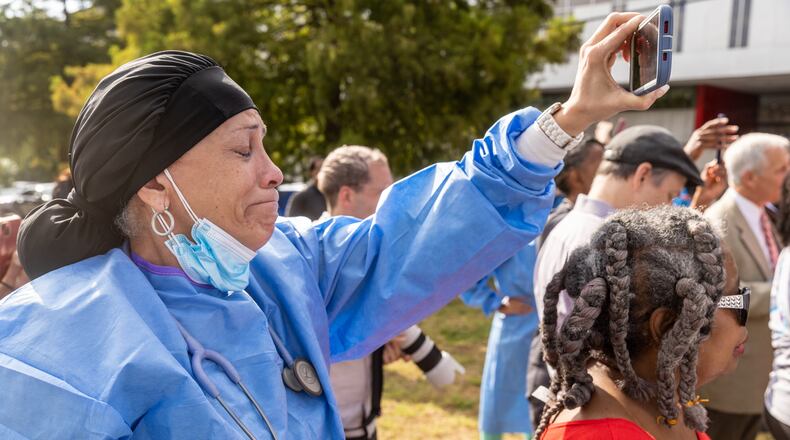The last time one of Atlanta’s key safety-net hospitals was on the verge of financial ruin, a public-private partnership rushed to save Grady Memorial Hospital with a new infusion of cash approved by the Republican-controlled Legislature and a tide of corporate support.
But elected officials expressed doubt about whether a new rescue mission could stave off Atlanta Medical Center’s closure, following Wellstar Health System’s sudden announcement this week that it would shutter the century-old hospital amid a tide of losses.
Had there been more time to plan for the closure, officials said, they could have worked to avert what metro Atlanta hospital executives say is a brewing healthcare disaster.
Local leaders, including Atlanta Mayor Andre Dickens and U.S. Rep. Nikema Williams, said they were blindsided by the news and have little time to assemble a campaign to avert the hospital’s Nov. 1 closure.
People familiar with internal discussions said Gov. Brian Kemp’s office hasn’t given up, with one official saying the Republican’s office is “looking at a wide variety of options to address the situation” without elaborating on specifics.
Dickens, meanwhile, told The Atlanta Journal-Constitution a solution might include finding another company to run the hospital. But Wellstar earlier cast doubt on that possibility, saying in a statement that it had tried and failed to find a “sustainable solution.”
At an event in the shadows of the downtown Atlanta hospital Friday morning, Democratic leaders said the only long-term proposition to buoy the hospital’s bottom line would be an expansion of Medicaid, a prospect that Kemp and other Republican leaders have long opposed as too costly and inflexible.
“We face a situation of a surprise announcement, a lack of coordination and an unwillingness from the state to partner to come up with creative and concrete solutions as we face the closure of the hospital,” said Atlanta City Council President Doug Shipman.
‘We made it stronger’
About 15 years ago, Grady was facing teetering finances amid a rising number of uninsured patients. Grady was on the verge of collapse in 2007 when corporate and community leaders banded together to save the facility, which like Atlanta Medical Center serves many of the metro area’s poor and uninsured.
They led an effort that transferred control of the hospital to a new corporate board, replaced the hospital chief and secured more than $300 million in donations to improve the facility and equipment.
In 2010, then-Gov. Sonny Perdue backed a new tax on hospital revenues to fill a gaping hole in a leaky state healthcare budget. Three years later, then-Gov. Nathan Deal extended the tax to help finance Medicaid services with an initiative backed by bipartisan community leaders.
“It was in the exact same situation and what happened?” said Shipman. “Because we had time, because we had partnerships between the county, the city, philanthropy, the private sector and the state, we not only saved Grady Hospital, we made it better and we made it stronger.”
The difference now, he said: “We do not have a partnership at the state level.”
Credit: Steve Schaefer
Credit: Steve Schaefer
Nearly every official at the press conference named a negative healthcare ranking for Georgia: high maternal mortality, highest rate of new HIV cases, high number of monkeypox cases, high number of uninsured residents.
Stacey Abrams, who has put healthcare policy at the center of her rematch against Kemp, said unlike 15 years ago there’s a ready funding source available for needy hospitals – an expansion of Medicaid under the Affordable Care Act, which would cover an estimated 600,000 eligible Georgians.
She said she wouldn’t be surprised if Kemp announced a “stopgap measure” to delay the hospital’s closure for a few months, until after the Nov. 8 election, but that it would only be a short-term fix.
“It will not be the solution to the fundamental problem: That we have a large population of low-income people in the state of Georgia who need health insurance in order for hospitals to function,” said Abrams.
Credit: Steve Schaefer
Credit: Steve Schaefer
Medicaid battle
Wellstar said in a statement that while expanding Medicaid could have helped the hospital’s “financial sustainability, it would not have changed this outcome.”
“AMC has sustained significant operating losses, including $107 million over the last 12 months,” said the statement.
Kemp’s campaign referred to Wellstar’s stance on Friday, saying that Abrams is “falsely blaming the governor” for the hospital’s financial struggles. He has advocated for a more limited Medicaid expansion tied to work and academic requirements.
“Stacey Abrams may be allergic to the truth,” said Kemp spokesman Tate Mitchell, “but the governor will keep fighting for more accessible and affordable healthcare for hardworking Georgians.”
Wellstar has not specified how it came to its financial conclusions. It has previously disclosed losing more than $300 million per year in providing indigent and charity care.
Some leaders are still holding out hope for a last-minute deal to salvage the 460-bed hospital, one of only two state-designated Level 1 trauma centers in metro Atlanta.
A coalition of federal lawmakers sent a letter to Wellstar’s chief executive Friday seeking a meeting with the healthcare giant’s leaders with a message that it’s not too late to “reverse course.”
Dickens told the AJC that the 60-day notice of a closure gives officials little wiggle room to avert what he said would be a disaster.
“It’s important right now that everybody that’s in healthcare comes to the table to come up with solutions,” said Dickens. “That solution may be another provider taking over that facility and providing care, or it could be getting Wellstar what they say they need to be able to survive.”
‘A huge effort’
Not all influential Atlanta institutions were anxious to pledge help or even to comment at all.
Messages from the AJC requesting comment were not answered by the Woodruff Foundation or representatives of Arthur Blank and Bernie Marcus, Atlanta businessmen with a history of boosting local institutions.
The Metro Atlanta Chamber was deeply involved in the effort to save Grady. So much so that when Katie Kirkpatrick became the chamber’s chief executive in 2020 she cited the effort to keep Grady afloat an example of the chamber taking “a lead role on an issue that touches all races and income levels.”
On Friday, Kirkpatrick said a broad coalition is needed to respond to the crisis and make sure that residents can receive healthcare they need. “We urge our elected officials, civic and university leaders, and business community to work together to determine a single, unified plan forward,” she said.
Other civic leaders were shaken by the news, said A.J. Robinson, president of Central Atlanta Progress, a non-profit group that has been working to support the city’s economy for eight decades.
“It is a very big deal,” he said. “I was at a couple meetings yesterday and everybody was kind of wringing their hands. A huge effort saved Grady Hospital when its survival was threatened more than a decade ago.”
A similar effort is needed now, Robinson said.
”There was a rallying in the community to do that,” he said. “It’s a little early in the day right now, but maybe there’ll be conversations about something like that.”
Staff writers Michael Kanell and Donovan Thomas contributed to this report
The Latest
Featured







